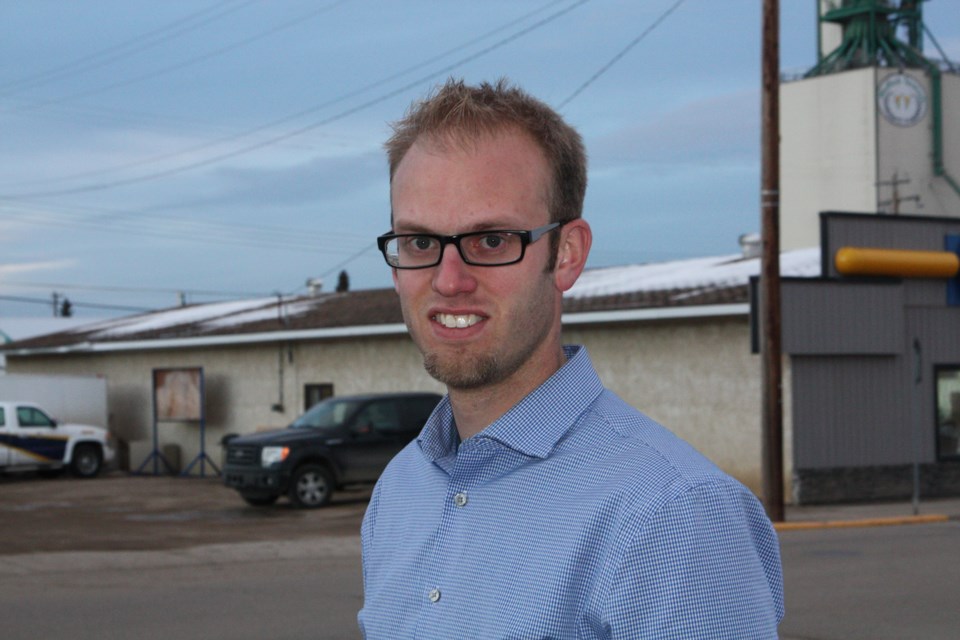BARRHEAD - Noting that the use of such legislation undermines the Canadian banking system and sets a dangerous precedent, Peace River-Westlock MP Arnold Viersen signaled last week his intention to vote against the Emergencies Act.
“This is like taking … a bazooka to kill a fly,” Viersen said in an interview Feb. 18.
On Feb. 14, prime minister Justin Trudeau announced that he would invoke the Emergencies Act to give the federal government temporary powers to deal with the ongoing protests against COVID-19 restrictions.
By invoking the legislation, Canadian financial institutions can temporarily cease providing financial services if the institution suspects an account is being used in support of the illegal blockades and occupations.
Deputy prime minister Chrystia Freeland said Feb. 17 that Canadian banks have already moved to freeze the accounts of some people associated with the “Freedom Convoy” occupying Ottawa.
She suggested that truck drivers may also see their insurance cancelled and their corporate accounts suspended.
The House of Commons and Senate began debating the invocation of the act Feb. 17 and MPs were slated to vote on the motion on Feb. 21 at 8 p.m. Eastern Standard Time (EST).
Notably, debate was cancelled on the morning of Feb. 18 due to police moving to remove Freedom Convoy protestors.
Viersen said the Speaker of the House and Sergeant-at-Arms sent out a notice to all MPs announcing that the debate on Friday was cancelled.
From his perspective, however, Viersen noted that he had more issues getting around Ottawa due to police action than any blockades set up by protestors, who he referred to as being demonized and slandered.
He also recalled that the federal government did not invoke the Emergencies Act to deal with other disruptive protests, such as the Extinction Rebellion blocking bridges in Edmonton or the Wet’suwet’en blockades against the Coastal Gaslink pipeline.
“Even when 9/11 happened, the government didn’t impose the Emergencies Act,” he said. “It’s a dramatic over-reach."
Viersen said that the most concerning thing about invoking the legislation was the undermining of the Canadian banking system by the prime minister.
He added that this action has caused huge concerns around the security of Canada’s banking system if the government can simply freeze the accounts of people they don’t agree with.
When it was pointed out that Canadians involved in financial crimes can have their accounts frozen by authorities, Viersen stressed that this was a political protest and no one should have their account frozen for donating $10 to a cause the government opposes.
“You’re not money laundering, you’re not involved in organized crime," he said.
Viersen also commented on the oft-repeated allegation that the convoy protests are being funded to a large extent by foreign entities. For instance, hundreds of donations to the convoy’s GoFundMe campaign, which has since been frozen, came from the U.S. and other foreign countries.
He noted with some irony that he had been calling for the government to investigate the foreign funding of political activists in Canada for years, referencing the Tides Foundation’s ongoing campaign against the Alberta oil development.
“I guess if we get some foreign funding legislation out of this, that would be an improvement, in my opinion,” he said.
Popular support
Viersen also commented on recent polling showing that two-thirds of Canadians support the invocation of the act to help handle the protests.
A Maru Public Opinion poll shows that more than 70 per cent of B.C., Atlantic Canada and Quebec residents support the move, though less than half of Albertans and Saskatchewan residents shared that opinion.
Viersen responded that the government shouldn’t be run based on public polling, noting that he wouldn’t agree either if half of Canadians wanted to suspend democracy.
“The thing about governing is you have to govern. And I think that Justin Trudeau’s failed miserably to govern this country, and to ensure that people felt like they’re being heard and that it didn’t have to come to this,” he said.
He argues that there were other options for quelling the protests, noting that the police had all the tools necessary to prevent the convoy from establishing a semi-permanent protest.
He pointed out that in other cities, demonstrations supporting the convoy have occurred and were dispersed within a day or two. As well, the border blockade at Coutts dissolved even before the Emergencies Act was invoked.
Viersen also laid blame at the feet of the Liberals for not better anticipating the protests or laying out a plan for the removal of COVID-19 restrictions.
“The government saw this coming and had the opportunity for laying out a plan, which is what we called for last week,” he said.
And while COVID-19 restrictions are partly the responsibility of provincial and federal governments, Viersen noted that it was the federal restriction on unvaccinated truckers crossing the border that sparked this protest.



